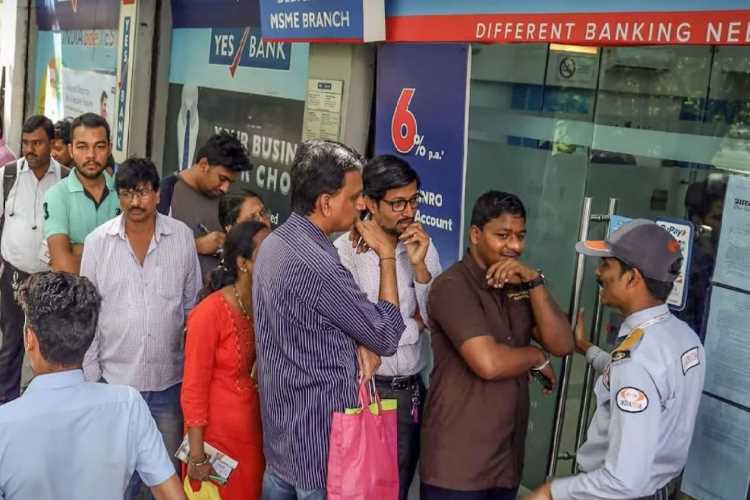
The markets have warmed up to the Yes Bank shares with the prices swinging back to Rs 60 from an all-time low of Rs 5 a few days back. Happening at a time when the global markets have taken a beating due to the coronavirus outbreak, this is being seen as the vindication of the efforts by the government to address the crisis by prodding SBI and some private banks such as ICICI Bank and Kotak Mahindra Bank to invest in the beleaguered bank.
There has been a distinct decline in the deposit base of Yes Bank in the run-up to the crisis and after. Would the same be restored to its previous levels by the steadfast action by the government? Given that the services offered by Yes Bank were no different from those offered by the others, it is to be seen whether depositors would once again repose faith in the bank in which the founder himself had no hope? It is surprising that the rapid growth in the bank’s loan portfolio skipped the banking regulator’s notice when the entire banking system was witnessing a slowdown. All this seem to have been taken for granted by the system. The Kapoors have manoeuvred the system in all ways they could, and created a new record of sorts in this regard. In fact, regulations do not matter for people like Yes Bank CEO Rana Kapoor who have mastered the art of out-manoeuvring them.
READ: IMF identifies three action areas to mitigate economic fallout of coronavirus outbreak
All the more startling is the fact that all of this was occurring when there has been a clamour for tighter regulation across the world, loosening the grip of the banking lobbyists of Wall Street on policy making. The Dodd Frank Act was brought in by the Obama administration. Further regulations proposed by Paul Volcker strictly prohibited proprietary trading in securities by banks. The US Financial Inquiry Committee Report drew attention to the links between banks and the shadow banking sector. It enumerated the umpteen methods including securitization through which the banks were trying to get around regulatory requirements. There has been a demand that the banks’ capital to assets ratio has to be strictly enforced, even when banks were arguing that the same was coming at the cost of profitability. (The fact that Donald Trump has been hugely generous in further extending concessions to the very same bankers cannot be overlooked.)
Several commentators have drawn attention to the two-way transactions that happened during the demonetisation that contributed to the crisis at Yes Bank. But one cannot ignore the contribution of higher statutory requirements of capital, which were meant to reduce the risks of the banking system, in precipitating the crisis. The higher capital requirements forced Yes Bank to issue ATR-1 bonds in two tranches of Rs 3,000 crore and Rs 5,415 crore in 2012 and 2016, respectively. This was a time when the bank had witnessed a high rate of credit growth. It was clear that the risk on those bonds that offered 10.5% returns were to be borne by the investors. The domestic retail and high net worth investors were not allowed to subscribe to the bonds. Now as the skeletons tumble out of the cupboards, it is being revealed that of the total amount mobilised under ATR-I bonds, Rs 1,000 crore was from high net worth investors.
READ: Towards a rounded policy: Parliament passes the Mineral Laws (Amendment) Bill
The mechanics here is of utmost importance. The sales campaign was spearheaded by Yes Bank employees, if one were to trust the testimonies of the aggrieved buyers of ATR-1 bonds. It appears that the same has been sold to them at a premium by different non-banking financial institutions. It is clear that many in the bank got a cut from the premium charged. Now are the depositors going to repose their trust in the same people? Even when the courts might not give a verdict in favour of the financial institutions that had picked up ATR-1 bonds, it is yet to be seen as to what the approach of the court would be towards the bank employees who duped the investors.
What holds true for ATR-1 bonds of Yes Bank may not necessarily be true in the case of other banks. But in the light of the fact that several banks have taken the route followed by Yes Bank to meet additional capital requirements under the Basel norms, the Reserve Bank of India should order a forensic audit of the size, composition and ownership of ATR-1 bonds issued by them. Are retail investors holding bonds issued by other banks too? Only a forensic audit would make it clear whether the banks that played the rescuer’s role in Yes Bank’s case are clean or not. The Yes Bank imbroglio may have been partially resolved, but the challenges posed are far from over. The story may have just begun.
(Krishnakumar S teaches economics at Sri Venkateswara College, University of Delhi.)
Krishnakumar S is a New Delhi-based economist. He teaches economics at Sri Venkateswara College, University of Delhi.

